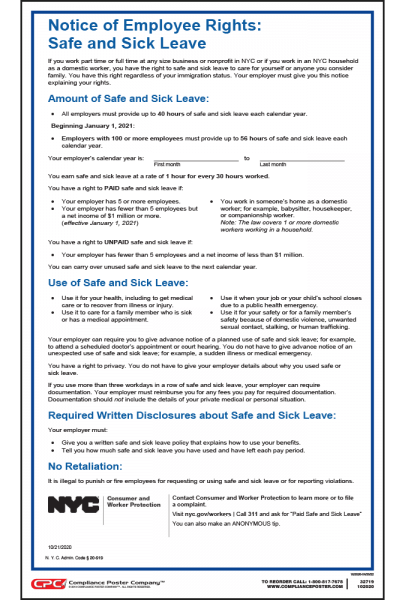New York State Sick Leave Law

What is the New York State Sick Leave Law?
The New York State Sick Leave Law requires employers to provide their employees with paid or unpaid sick leave, depending on the size of the employer and the number of employees. The law applies to all employers in New York State, including those in New York City, and covers all types of employees, including full-time, part-time, and temporary workers.
Who is Covered by the New York State Sick Leave Law?
All employees who work for an employer in New York State are covered by the New York State Sick Leave Law, regardless of their job title or classification. This includes both part-time and full-time employees, as well as seasonal and temporary workers. Independent contractors and freelancers are not covered by the law.
How Much Sick Leave are Employees Entitled to?
Under the New York State Sick Leave Law, employees are entitled to up to 40 hours of sick leave per year, depending on the size of the employer and the number of employees. Employers with 100 or more employees must provide their employees with up to 56 hours of sick leave per year, while employers with fewer than five employees must provide their employees with up to 40 hours of unpaid sick leave per year.
How to Use Sick Leave?
Employees can use sick leave for their own illness or injury, as well as for the illness or injury of a family member. Sick leave can also be used for reasons related to domestic violence, sexual assault, or stalking. Employers cannot require employees to find a replacement worker to cover their shift while they are on sick leave.
How to Request Sick Leave?
Employees can request sick leave by notifying their employer as soon as possible before their scheduled shift. If the need for sick leave is unforeseeable, employees should notify their employer as soon as possible. Employers cannot require employees to provide documentation or a doctor's note unless the employee has used more than three consecutive days of sick leave.
What Happens to Unused Sick Leave?
Unused sick leave can be carried over from year to year, but employers can limit the amount of sick leave that can be carried over. Alternatively, employers can provide employees with the option to cash out unused sick leave at the end of the year.
Advantages and Disadvantages of the New York State Sick Leave Law
Advantages
- Provides job security and financial stability for employees during times of illness or injury
- Encourages employees to take time off when they are sick, reducing the spread of illness in the workplace
- Helps to improve employee morale and productivity
Disadvantages
- May result in increased costs for employers, particularly small businesses
- May lead to abuse of sick leave by some employees
- May require employers to find replacement workers to cover shifts, resulting in scheduling difficulties
FAQs
Q: What happens if an employer fails to provide sick leave to their employees?
A: Employers who fail to provide sick leave to their employees can be subject to fines and penalties under the law.
Q: Can employees use sick leave for mental health reasons?
A: Yes, employees can use sick leave for mental health reasons, as well as for physical health reasons.
Q: Can employers require employees to provide documentation or a doctor's note when using sick leave?
A: Employers can only require documentation or a doctor's note if the employee has used more than three consecutive days of sick leave.
Q: Can employers provide more sick leave than is required by the law?
A: Yes, employers can provide more sick leave than is required by the law if they choose to do so.
